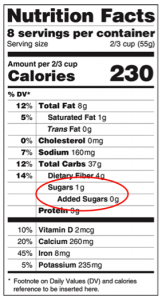
One of the hottest topics in food science today is the discussion around sugar. What often gets lost in the conversation however, is the distinction between the adjectives ‘natural’ and ‘added.’ Both natural sugars and added sugars form simple carbohydrates. Where they differ is that foods with natural sugar also contain complex carbohydrates, vitamins, and minerals. Added sugars provide added/empty calories with no nutritional value
In addition, foods with complex carbohydrates and natural sugar retain nutrients, such as dietary fiber, that are removed from simple carbohydrates. Complex carbohydrates are essential to our body and are broken down into glucose slower than simple carbohydrates, which means they provide longer lasting energy. (Think nature’s foods … fruits, vegetables and whole grains.
As we all strive to feed our kids (and ourselves) healthy, nutrient-rich foods, we have come to rely on food labels to help us determine which products to purchase. When it comes to the sugar debate though, one of the biggest challenges we face is deciphering where its coming from since the label simply lists ‘sugar’ without differentiating between natural and added sources.
Good news (potentially)! In July of 2015, the FDA issued supplemental proposed rules, one of which was to include the percent daily value (%DV) for added sugars on the Nutrition Facts label of packaged foods.
The percent daily value specifies how much a nutrient in a serving of food contributes to a daily diet and would be based on the recommendation that the daily intake of calories from added sugars not exceed 10 percent of total calories. (For reference, four grams of sugar equal one teaspoon.)
Some common words for added sugar are sucrose, dextrose, high fructose corn syrup, maltose, and fruit concentrate. But did you know there are at least 56 names for sugar? So, as we’re waiting for these proposed changes to take place (manufacturers have two years to conform once the measure is finalized), we listed them all here (in alphabetical order) for your convenience. There’s nothing more empowering than being an educated consumer!
| 1. Barley malt 2. Barbados sugar 3. Beet sugar 4. Brown sugar 5. Buttered syrup 6. Cane juice 7. Cane sugar 8. Caramel 9. Corn syrup 10. Corn syrup solids 11. Confectioner’s sugar 12. Carob syrup 13. Castor sugar 14. Date sugar 15. Dehydrated cane juice 16. Demerara sugar 17. Dextran 18. Dextrose 19. Diastatic malt 20. Diatase 21. Ethyl maltol 22. Free Flowing Brown Sugars 23. Fructose 24. Fruit juice 25. Fruit juice concentrate 26. Galactose 27. Glucose 28. Glucose solids |
29. Golden sugar 30. Golden syrup 31. Grape sugar 32. HFCS (High Fructose Corn Syrup) 33. Honey 34. Icing sugar 35. Invert sugar 36. Lactose 37. Malt 38. Maltodextrin 39. Maltose 40. Malt syrup 41. Mannitol 42. Maple syrup 43. Molasses 44. Muscovado 45. Panocha 46. Powdered Sugar 47. Raw sugar 48. Refiner’s syrup 49. Rice syrup 50. Sorbitol 51. Sorghum syrup 52. Sucrose 53. Sugar (granulated) 54. Treacle 55. Turbinado sugar 56. Yellow sugar |
The motto of The OrganWise Guys is Empowering Kids (of all ages) to be Healthy and Smart from the Inside Out!, so we hope this information does just that! For more resources to help your family get healthy, check our FREE Kids Page for coloring/activity sheets, recipes, videos and so much more.


